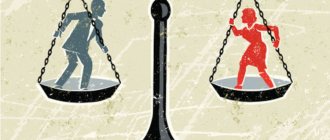Updated July 23, 2021 215 Author: Dmitry Petrov
“Attempts to explain defeats solely by unfair refereeing, the vagaries of the weather, the machinations of competitors... this is the lot of outsiders.” V.V. Putin, President of the Russian Federation
Hello, dear readers of the KtoNaNovenkogo.ru blog. There are many words borrowed at different times from other languages and, due to their specificity, are not intuitive.
One of these words was outsider. This is a borrowing from English, which has existed quite harmoniously in the Russian vocabulary for about 60 years, but many do not fully understand what it is.
Therefore, today we will talk about outsiders, their position in society, and also learn about bullying and the art of the marginalized. It will be interesting, don’t switch...
What is an outsider?
Athletes know well who the underdogs are. This term came to us from the English language. Outsider literally translates as “overboard.” Sometimes this means extra or extraneous. In sports, an outsider is a person who lost, that is, found himself “overboard” from the competition. The losing team that is eliminated from the competition is also called.
An outsider in psychology is a weak person; no one is interested in his opinion. In the modern business world, large enterprises have monopolists that control the market. Unprofitable, small enterprises that are on the verge of bankruptcy are considered outsiders in the market.
Professional stock traders consider losers, beginners, and other amateur traders who do not know how to correctly assess risks to be outsiders.
In the art world there are quite complex criteria for assessing masterpieces. It is difficult to predict what will become the object of admiration from critics and ordinary viewers. It is impossible to compare “La Gioconda” by Leonardo da Vinci, “The Square” by Malevich, or a banana taped to the wall by Maurizio Cattelan. However, there is an art movement that is considered "Outsider Art", called "Art Brut". Initially, this was the name given to the work of mentally ill people with serious mental disorders.
Later, the works of children and “savages” from art were included here, that is, those whom the masters consider primitivists. An outsider artist does not have a specialized education, does not advertise his activities, and does not consider himself an artist at all. He does not need laurels, auctions and gallery exhibitions. He is a loner, withdrawn into himself, not dreaming of recognition from society, and his work can only be seen by outsiders by chance.
Dictionary of economic terms
(from English outsider - outsider)
1) a company, an enterprise in any industry that is not part of a monopolistic association of entrepreneurs in this industry, the so-called “wild”, outsider, occupying one of the last places on the market for a given product in terms of key indicators;
2) a person who speculates on the stock exchange, but not constantly; non-professional stock speculator;
3) “outside inventor” (who is not an employee of this enterprise);
4) a broker who is not a member of the exchange, but has permission to work on the trading floor subject to the established rules of exchange work.
What character traits does an outsider have?
Outsiders are people with low self-esteem who do not know how to carve out a “place in the sun” for themselves. In an era of universal equality, society still distributes roles in society. In every team there are leaders, there are middle people, and there are outcasts. No one takes into account outcasts, they are not valued and are immediately forgotten about. This is neither good nor bad, it is the usual model of an ecosystem in which every niche must be occupied. Competition becomes meaningless if everyone has equal abilities and strengths.
Outsiders will not even enter the fight, since they are already confident of their loss. They would prefer to stand on the sidelines and just watch life pass by. And this is not laziness, but the fear of being in the center of attention, of becoming an object of ridicule. An outsider has an abundance of shyness, and it overshadows all the talents that a person possesses.
Outsiders are often envious and touchy. They will always find an excuse and never tire of feeling sorry for themselves. The outsider is silent and prefers the life of a hermit, avoiding any holidays and entertainment.
Social group structure
Any social group in its structure is similar to a certain ecosystem populated by living organisms. Each organism in this system has its own niche. For the system to function normally, all niches of the ecosystem must be filled. A lack of living organisms in one of them or an excess in another threatens the life of the entire ecosystem.
Therefore, if the balance in the system is disturbed, then it either replenishes it itself or gets rid of the excess number of organisms.
Any social group, large or small, is characterized by stratification into the same niches. The group tries to push someone into an empty niche, and push someone out of a crowded one. In this way the group restores the necessary balance.
An empty niche is usually reserved for an outsider. There are no competitors in this niche; no one wants to voluntarily fit into it. But for balance, the team fills it out at its own discretion. Usually a person gets there who is in some way much inferior to the others.
If the place is still empty, then with a high degree of probability a newcomer will get there. An outsider is the one who came to the group last. But if the niche turns out to be occupied when he arrives, then the newcomer automatically moves to the next one.
What makes a person an outsider in society?
Society has a complex structure and consists of many groups. Each group has its own hierarchy. By analogy with the animal world, in which there are plants, bacteria, predators and herbivores, the principle is the same in society. In a flock of lions there is always a leader and there are outcasts, and strong trees do not allow the young to develop in their shadow. Each group has leaders and laggards.
An outsider at work never strives to stand out. This is an uninitiative subject. He is not invited to corporate events because they simply forget about his existence. This is a quiet person who sits in a corner, doesn’t ask for a raise, doesn’t argue with anyone, and silently does his job.
Most often, an outsider in life does not have clear life plans. He just goes with the flow without trying to fight. He studies and works where his parents placed him, and he gets married only at his parents’ insistence.
Important: do not confuse the concepts of insider and outsider. Despite their similarity, these terms have completely different meanings. An insider is a person who has classified information. Secret information makes an insider valuable. Although an outsider can also be an insider. After all, a team in a super-secret service can consist of leaders and outsiders.
Ozhegov's Dictionary
OUTSIDER [de], a, m.
1. A sports team (or athlete) that took one of the last places and was eliminated from the main participants. Outsiders of the Champions Cup.
2. transfer The one who, having failed, dropped out of the number of participants. affairs, enterprises. A. in elections (about a candidate who did not receive the required number of votes).
3. An enterprise operating close to and simultaneously with a monopoly, but not part of it (special). Firm-a.
| adj. outsider, oh, oh.
Why is being an outsider bad?
Bullying is another word that comes to us from the English language and means bullying, or violence. As a rule, bullying does not have clear age restrictions; the main condition is the presence of a team. Bullying and violence can be both psychological and physical, and the target of bullying is an outsider.
An outsider at school is usually a newcomer or a child with some differences. The team leader can appoint anyone as an outsider, and this “vacancy” is not permanent.
In the study of teenage bullying, certain tests were conducted. The researchers selected leaders from several teams, who were combined into a new group. The new team was made up of selected outsiders. Soon enough, in these new teams there was again a stratification into leaders and outsiders. That is, in each group there are roles that are distributed by a stronger leader, and no matter what place he occupied in the previous community. Any person can be an outsider if this position is currently vacant.
Outsiders are used by leaders and their associates. At school, this can be expressed in demanding money, performing any tasks from the leader, and anything else that comes into his head. Often the victim is subjected to beatings, violence, even the use of weapons. For a leader, this is a way to assert himself at the expense of a weaker outsider and increase his own rating. A striking example of an outsider is presented in the film “Scarecrow” by Rolan Bykov.
It would seem that with age these “children’s games” go away and adults do not face bullying, but this is not so. Bullying is becoming less visible, but more sophisticated. Even in the team of teachers, people who must sow the good and eternal, one can find this division into leaders and outsiders. For outsiders, they deliberately create an inconvenient schedule, dump all extracurricular work, find a reason to deprive them of bonuses, or give them a reprimand.
Any team is divided into leaders, outsiders and witnesses to this confrontation. “Witnesses” will never come to the aid of an outsider for fear of ending up in that place themselves. Taking part in bullying or simply observing from the sidelines, they also experience a kind of psychological violence. The feeling of helplessness in front of a crowd, shame for one’s own behavior, makes one lose self-confidence.
A leader, inspired by his own impunity, can cross the line that separates “childish pranks” from a crime. Thus, all participants in the process suffer from such bullying.
The victim of bullying, an outsider, can escape from this trap only by moving to another team. And oddly enough, he himself can become a leader, or a “witness” of bullying in another team.
Disadvantages of outsiders
An outsider who has pronounced negative traits is a convenient excuse for everyone who also has these traits.
With his obvious or often artificially accentuated inferiority, he focuses the projection of the complete group “negativity” on himself. Such a person is a necessary element of the balance of the complete socio-psychological “ecosystem”. From the first days of the existence of the school class, the children's community strives to stratify itself according to socio-psychological archetypes. The group within its composition selects the most suitable candidates for a certain social role and actually forces them into the necessary niches.
Children with pronounced external defects, stupid, unkempt, and so on are immediately chosen to play the role of outsiders.
Their very first awkwardnesses and mistakes leave an indelible mark on them, with which they must live for many years in the future, being the object of outright bullying and ridicule (cold ignorance as an instrument of rejection is almost never encountered in the children’s community, since it does not correspond to the task of supporting psychological “ homeostasis").
This hypothesis could be tested experimentally using the following - unfortunately, difficult to implement - experiment: from a dozen classes of different schools, based on the results of sociometry, select outsiders and form a new class from them. It can be assumed that the structure of the new group will very soon have its own “stars” and its own outcasts. Perhaps a similar result can be obtained when selecting leaders or geniuses.
Outsider – translated from English as “outsider”.
This word can be used to designate a company that is not included in any association in its industry. An outsider is also a person who plays on the exchange from time to time and a broker who is not a member of the exchange, but may have the right to work on the exchange floor, provided that he follows the generally accepted rules of work in this room.
Outsider (English outsider - outsider) In Russian it means “lagging behind”. Less commonly used as a direct translation from English, meaning “located outside of something.”
How to stop being an outsider?
- Most psychological problems come from childhood. Often parents, without realizing it, raise an ideal victim who will be an outsider in any team. Strong-willed and despotic parents suppress any initiatives of the child. He doesn’t have a drawing, but “scrawlings,” the cup is poorly washed, and in general he is an “armless dumbass.” Any of his actions are criticized, devalued, and over time the child closes down. He stops even trying to take the initiative, so as not to run into another portion of criticism or insults.
- Thus, parents want to motivate the child to work harder and better, but young children need approval and praise, even for “scribbles.” This is what motivates them to keep trying new things and developing themselves. It is important for a child to realize his worth, first from his parents, and then in adolescence among his peers.
An outsider can be a child who has some physical disabilities or differences. These are redheads, albinos, short and overweight, children with glasses or braces. There are many options, but these differences are just a reason to get hooked. Several people in a team may have poor eyesight, but not all of them will become outsiders. And the leader may be a fat man with braces, but no one will dare to mock him for fear of getting rebuffed. It all depends specifically on the person. Of course, I'm exaggerating a little, but this really happens.
- Parents instill complexes in their own children, and this is reinforced during school years. The child is confident in his own “flawedness” and he is ready to accept punishment for this. Most suicide attempts are made by outsiders as a result of bullying in a group.
- An outsider is a victim and it is his weakness, vulnerability, inability to stand up for himself that provokes the leader to aggression. It is convenient for baiting. From the first glance at him, it is clear that he will not complain and will not be able to answer.
- To stop being an outsider, you need to shed this image of a victim. It should be understood that even a leader without the support and approval of the crowd will become the same outsider. He occupies his position only because through force and arrogance he managed to win the recognition of the team. By acting as an aggressor, the leader tries to hide his own complexes.
- You can develop leadership skills and break out of the “club of losers.” A leader is charisma, activity, initiative, sociability and optimism.
- It is believed that charisma is a gift from God; you either have it or you don’t. This is partly true, but with proper persistence, charisma can be developed. There are many works on the topic of how to develop charisma and these tips are worth taking advantage of.
- There is no need to be afraid of new achievements. Everyone learns from their mistakes and that's normal. You shouldn’t scold yourself for them, since they are the ones who provide the most valuable experience that everyone needs.
- It is important to overcome your isolation and embarrassment. You should find people with similar interests and gradually expand your social circle. Constant training will help even the most modest silent person become a sociable person.
- Optimism is a character trait acquired during evolution. It was optimism that helped our ancestors survive, and this quality can be developed in oneself. An optimistic attitude helps you cope with troubles more easily and look into the future without fear.
- Forgive yourself for all your mistakes and learn to love yourself. Just like that, for no reason, just because you exist. Accept yourself with all your shortcomings, strengths and talents. Ideal people do not exist, and it all depends on how they position themselves in society.
Insider trading
The term “insider trading” refers to trading operations in the financial field carried out by persons who have direct confidential information about a particular issuer, who, in turn, issue their securities on trading platforms.
Today, insider trading can manifest itself in two different types. Namely, in the form of legal activities, and, accordingly, in the form of illegal trade and financial activities.
Insider attack
“Insider attack” is a term that should not be taken literally. That is, this is not an action of “attack of the enemy” (competitor). But rather, a certain “primary source”, a kind of “reference point” in the dynamics of movements of quotes of certain securities of the issuer. The “initiator” of a global trend, if you like, but it is important to understand that the “insider attack” is not only competition (but it is also mandatory), but also the leading primary initiative of most global movements!
Thus, there are a number of aspects that determine its significant importance as a participant in exchange trading in the securities market. This refers to the importance of the actions (attacks) of the insider. You and I, within the framework of this paragraph, will consider 2 main parameters that appear in the defining moments of this concept;
Most of the forecasts of leading experts are made based on the actions of an insider!
That is, by giving the most banal example, we can understand that suppose the company slowly, gradually and surely goes bankrupt. But so far only the higher rank himself – the director of this organization – knows about this. He, in this particular situation, being an insider, begins to actively sell off the shares of his issuer, even at a fairly reasonable price. And before information about the deplorable state of the organization becomes public domain, the quotes of these securities will inevitably collapse!
Here, it is worth focusing your attention on the fact that these actions of an insider (director of this company) are illegal, since with each security sold, the company plunges deeper into the abyss of bankruptcy . If you look at this situation from a different angle, then the collapse of quotes can be interpreted as a deliberate action by an insider. At the same time, you and I understand that the insider himself unpiously enriched himself due to the downward movement, which he himself organized. Otherwise, we can say that he made money on shorts.
Afterword
Friends, here, in conclusion, I would like to voice probably the most important information regarding insiders. Information that, for some reason, could not “fit” into other chapters of this material. So, while reading this post, have any of you wondered; “Why control insiders”?
After all, if you think superficially (!), then insiders are precisely those market participants who provide financial markets with the liquidity of instruments that we so need to make good money! So why limit them in their actions?
I offer a great mutually beneficial deal
I have great free video lessons:
- About a major player
- About market mechanics
- About levels
Subscribe to our newsletter
It takes half a minute to subscribe and immediately after subscribing you receive an email with a link to the lessons.
Not legal insider trading.
Although, to be extremely frank, then, of course, in the plots of similar films about the life activities of insiders, there are, of course, more scenes and endings that break the law. After all, the illegal use of confidential information, in particular by third parties, involves going beyond the legal framework.
It is not uncommon for such actions on the part of insiders to entail a number of penalties, administrative and even criminal liability! And here, we can also give an example when the wife of a member of directors finds out some “closed” information, and subsequently uses it when concluding financial transactions on stock exchanges, in which case she is a malicious violator of the law on insider knowledge!
Responsibility for violating the law of trading using insider information
The key concept in this legal segment is that a person who has free access to confidential information from any of the organizations (that issue their securities on stock exchanges) must clearly understand that this is the property of the company. And like any other canon, the inadmissibility of transferring private information to third parties implies punishment, in accordance with the regulations on securities in financial markets.
Video lessons by Artyom Zvezdin
VSA analysis must be studied consistently, otherwise there will be no point.
I suggest you plunge headlong into awesome video lessons from the pros. Find out everything about VSA and get tips and secrets
Thus, the above example of the director’s wife, or rather her actions, are regarded as trading based on information from an insider obtained illegally! And administrative and/or criminal punishment for such offenses, as a rule, are determined in accordance with the scale of damage to the company or organization incurred as a result of the “insider attack”!
Legal insider trading.
In the Russian sphere of exchange trading, for some reason it is generally accepted that trading operations carried out directly by insiders are illegal. Most likely, this is due to the association of movie heroes of American cinema, in the plot and roles of which there are rather negative heroes. And in truth, if you watch some of the Western, specifically feature films, about stock trading and about the life of legendary traders...
...Where all the “worst things” are covered, deception, weapons, whores and cocaine, here, involuntarily, it becomes obvious that the use of insider information is a crime at the legislative level. But friends, without reliably understanding what is illegal and what is completely legal, you can watch the series with an incorrect perception of some aspects regarding the legitimate actions of insiders, and, at the same time, “bad guys”!
In fact, legal trading by insiders is a fairly common phenomenon in stock trading . Since members of organizations and corporations whose securities are traded on financial markets are often, or rather, often, owners of shares, bonds and options of these companies. For example, in the United States of America, such transactions are concluded publicly, by filling out special forms that provide the appropriate commission from central banks.
An insider can destroy the company!
The matter would have taken a different turn if our “character”, an insider, had entered into trading transactions only after the announcement in the media of the probable bankruptcy of the company. In that case, he would not have proceeded with the law. And in the above circumstances, “stake him”! No, seriously, such greedy individuals are annoying! And here, we smoothly, and almost closely, approached the second aspect, which determines the most important role of insiders.
An insider is capable of destroying a company or enterprise by transferring some confidential information to a third party!
Failure of profitable deals, loss of some part of the total capital, damage to the company's reputation - these are the smallest and most insignificant troubles that an insider can cause to the company. The key danger lies in direct interference in the economic activities of the organization. And if trade transactions are carried out at the interstate level, then due to public and internal resonance, including, we can even talk about a threat to national security!
Do you even imagine the scale of the damage resulting from “merely” disclosing confidential information (“merely” – sarcasm)! Thus, in the investor environment there is a fairly common unspoken formula, according to which unauthorized disclosure of even 20% (!) of corporate secret data by an insider leads to bankruptcy in 60% (!) of cases!
Writing materials on trading in text is very difficult. It is much easier to do them in video format. This is what we have been doing for more than 6 years! Subscribe to us and get the cream of information!
YouTube channel
An example is historical information, according to which, in 2005, the well-known and quite popular at that time American center CardSystems Solutions was unable to prevent the leak of 40 million credit card numbers. As a result of such an insider attack, all major clients refused to cooperate with this center within just 1 month.
As a result of this, to put it mildly, unpleasant collapse, government agencies in the United States imposed a multimillion-dollar fine on the once successful corporation. After just six months, a “ridiculous” one in terms of the scale of the damage, a promising, solid and successful company was bought for a purely symbolic price by one of its small competitors!
Bank Card Systems










